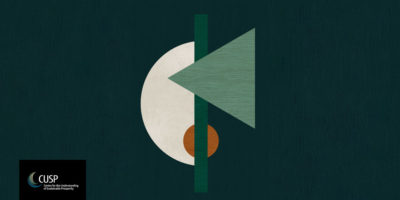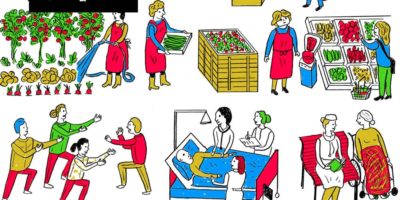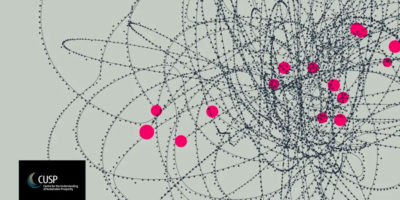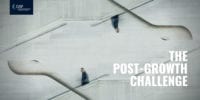Imagining a postgrowth world
Growth is unsustainable. But the world beyond growth is frightening. We have built an economy that is dependent on growth. We must learn anew how society works, when the economy is not growing. And we need to confront the impossibility theorems presented to us by those who resist change. A speech delivered by Tim Jackson for the Closing Plenary at the #BeyondGrowth conference in the European Parliament, Brussels 17 May 2023.
By Tim Jackson
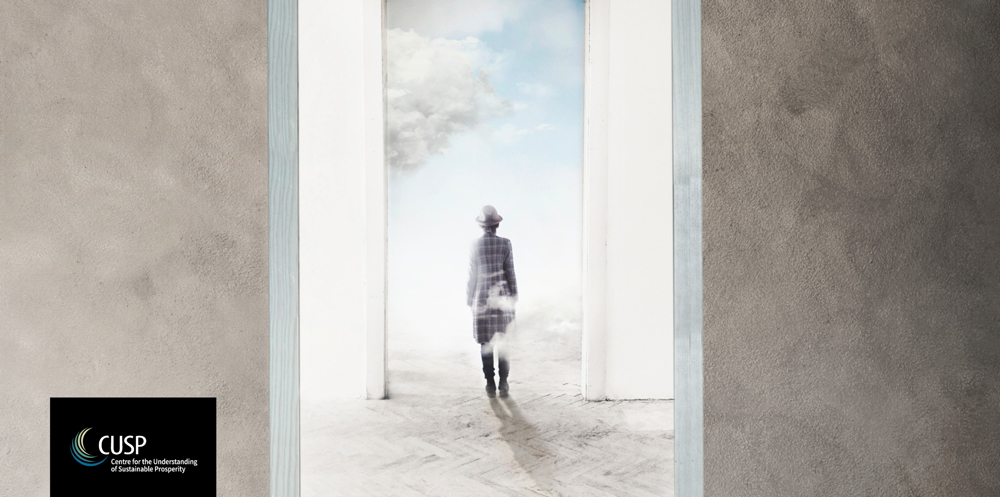
It’s wonderful to be here with you today in the Hemisphere. You don’t need me to tell you that this discussion doesn’t happen here every day. I know. It’s difficult to believe. But it’s true. Come Monday—or perhaps even tomorrow, this space is at risk of being reclaimed by the mantra of growth.
Philippe’s opposition to that mantra is legendary and he’s engaged in the struggle with a sense of calm purpose, charismatic humanism and deep commitment. This conference is the culmination of that commitment.
So thank you again, Philippe (and your team) for bringing us all together here today.
I want to start somewhere a little calmer. A little quieter. Last night I was invited to a salon at Full Circle just a few minutes down the road from here to speak on the theme: ‘imagining a postgrowth economy’. The room was full. The conversation was lively. The debate was invigorating.
And then, right at the end, a young woman asked me: what does a postgrowth economy have to offer to a generation fearful for their future? A high school teacher emphasised the same point. He had lost sight, he said, of what to say to his kids, when faced with the same question.
It struck me, not for the first time. There is no easy answer to this question.
It’s easy to see that this anxiety is in part a reflection of the deeply dysfunctional nature of our economic system. It’s in part a result of a kind of dream we have tried to sell to our kids, to each other. A fantasy that it is always possible for everyone always to have more and more. That there are no limits to our aspirations for material progress. That technology can solve all our problems. That the economy can expand forever.
This is the myth of our time. The myth of growth. The mantra that guides our political thinking, our economic science, our sense of progress. That more and more is always possible.
But now that myth has come dangerously unravelled. It has bequeathed a climate in crisis. An unprecedented loss of nature. It has triggered financial instability. It has legitimised austerity. It has contributed to war. It has been possible for the few only at the expense of impoverishing the many.
Our obsessive pursuit of economic growth has even blinded us to what mainstream economists now recognise as a ‘new normal’, a gradual decline in the growth rate not just because of Ukraine, not just because of Covid, not just a hangover from the financial crisis or the misplaced austerity that attempted to fix it, but a ‘secular stagnation’ across the OECD nations that has been creeping up on us for decades.
This new world is one we are totally unprepared for. A place where conventional economics has no real answers. A world where ‘fairytales of eternal economic growth’, as Greta Thunberg has called them, are leading us not towards paradise but towards disaster.
Of the dream that was our culture, to paraphrase something the French sculptor Camille Claudel once said. This is the nightmare. No wonder our kids are terrified.
But their question remains. How can imagining a postgrowth world help us here?
I believe it can help us in three distinct ways. It can turn the concept of limits on its head. It can focus our minds on core characteristics of a postgrowth economy. And it can bring into focus, more clearly than before, the nature of the struggle we now face. Let me say a little about each of these things in the time I have today.
When the Club of Rome published its Limits to Growth report back in 1972, economists and politicians lined up to condemn it. There’s a famous quote about it from Ronald Reagan. There are no great limits to growth, he said. Because there are no limits on the human capacity for intelligence, imagination and wonder.
Shortly before the pandemic in January 2020, another remarkably insightful US President gave a speech in Davos condemning the climate activists—young people with exactly the same anxieties raised in the salon yesterday. ‘To embrace the possibilities of tomorrow,’ he said. ‘We must reject the perennial prophets of doom and their predictions of apocalypse. They are the heirs of yesterday’s foolish fortune tellers.’
Our hero gazed out across the savannah of upturned faces towards the horizon of endless opportunity. Paradise is a land forged by a frontier mentality. Burn it down, dig it up, build over it. Progress is a construction site. It may look messy for now. But tomorrow’s condominiums and shopping malls will be a glorious sight. Let those who doubt this vision perish. The school kids, the climate activists, the extinction rebels. They can all go to hell.
This rejection of limits is a massive cultural blind spot. The relentless pursuit of more blinds us to human nature. It prioritises, it institutionalises voracious greed. But it neglects our deepest needs for belonging, for connection, for community, for a sense of purpose and meaning. It precipitates a casual swipe-right consumerism that promises the world, but leaves us ultimately, endlessly, unsatisfied.
Characterising prosperity as the relentless accumulation of wealth is a denial of our humanity. A denial of the interdependent web of life on planet earth. A denial of death. It appears to offer us consolation. But it cannot extinguish the anguish in our souls. The longing for something deeper.
Now, I realise we’re on difficult ground here. If we teach our kids there are no limits at all, they will become disillusioned and dysfunctional adults. If we suggest that the world is a dark and foreboding prison, they will never achieve their full potential.
But retrenchment and denial are not the only response to the reality of limits. Acceptance. And adaptation. These offer a far more creative alternative. Human and earthly limits, properly understood, wrote the conservationist Wendell Berry, are not confinements, but rather inducements to fullness of relationship and meaning.
Beyond our material limits—beyond growth, he was suggesting, lies another world. A place worth visiting. An investment worth making. Beyond the limits to affluence lies an affluence that only limits can reveal to us. Limits are the gateway to the limitless.
I believe this insight is part of an answer to the anxiety expressed to me yesterday so eloquently. A way of looking at the world and being in the world that allows for realism but encourages aspiration.
But to make progress on this insight we need not only to challenge the rejection of limits. We also need to revisit the definition of prosperity. To ask again and again: what can prosperity possibly mean on a finite planet. And if we are to replace the narrow definition of prosperity as wealth with something meaningful, there is a blindingly obvious starting point.
The foundation for all our prosperity is health. Health is one of the first things people identify, when you ask them about their priorities in life. Our own health. Our family’s health. Our community’s health. The planet’s health.
And this conception guides us immediately away from growth. Health is not about having more and more. Health is about balance. It involves what Aristotle called a ‘virtuous’ balance between deficiency and excess. It positions itself directly counter to the myth of growth.
And something quite surprising follows from this. To deliver prosperity as health, we need an economy whose guiding principle is care.
Amongst the many excellent side events of this extraordinary conference was one that focussed on the challenges of the care economy. I spoke on the panel there. And I promised to bring some of its ideas back into this plenary. In fact, my own argument there was that it should have been a plenary event in the first place.
The care and attention of one human being to another and to the conditions of living lies at what Nancy Folbre called the ‘invisible heart’ of the economy. While Adam Smith’s invisible hand is busy insisting that we are all selfish consumers, Folbre point out that without care we are nothing. Our children would lead stunted lives. The sick would find no respite. The dying no solace.
Our societies are nothing. Our progress means nothing. Without care there is no economy. Not even at the most basic level. The Covid pandemic brought this home to us forcefully. But its lessons are already slipping from our minds. They must not be allowed to. The care economy is not just a sideshow in the search for a postgrowth world. It is the blueprint for it.
Feminist economists have been making this argument for decades. The lion’s share of care work (paid and unpaid) is done by women. And, quite possibly because of this, care work has been denigrated in modern society. Not accidentally or inadvertently, but systematically.
Capitalism externalises the burden of care. In much the same way that it externalises nature. By counting the wrong things. By valuing the wrong things. By focusing on narrow definitions of productivity that privilege profits above wages and working conditions. By rigging the rules of the game. And by refusing to change.
And this brings me to my third and final point.
We should be in no doubt that we are confronted with a difficult dilemma. Perhaps the most profound dilemma of our times. Growth is unsustainable. But the world beyond growth is frightening. We have built an economy that is dependent on growth. We must learn anew how society works, when the economy is not growing. How welfare systems work. How financial systems work. How government works.
And we need to confront the impossibility theorems presented to us by those who resist change.
If you think you are looking at a dysfunctional system that benefits noone, then you are probably not looking hard enough. The fine words and supportive gestures of those who cling to power hide vested interests intent on sabotaging progress.
And this is where our allegiance to care must be tempered with realism. Our compassion for each other toughened with an iron resolve. Our infinite creativity grounded in a sense of struggle.
To wake up each day to a sense of security and comfort is a beguiling vision for our lives. To wake up to a sense of struggle can take our breath away. And yet, that struggle provides another kind of answer to the challenging question posed to me last night (by that young woman). How can a postgrowth economy help a generation of young people face a future filled with anxiety and doubt?
Not through a rose-tinted sense of blind hope. Not through a false promise of more and more. Not by vague assurances that everything will be ok. But through a commitment to the struggle.
The antidote to despair lies not in hope but in action. In agency. In engaging with all our creative energy in the task ahead. A path through the limits towards the limitless. A prosperity based not on wealth but on health. A struggle to unravel the systematic distortion of values that lies at the core of a broken capitalism. And to construct in its place an economy of care and craft and creativity, fit for purpose on a finite planet.
And that is why in closing, I’d like to offer my profound thanks again to Philippe Lambert for his engagement in that struggle over so many years now and in particular of course in bringing this conference to the European Parliament.
Thank you.

